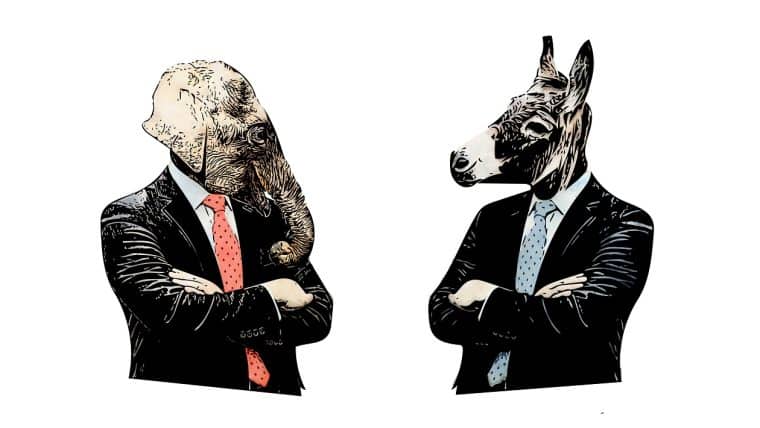
As the debate surrounding stablecoin regulation resurfaces on Capitol Hill, lawmakers find themselves entangled in partisan disagreements that threaten the future of crypto regulation in the United States. Will they be able to bridge the divide and create a stable regulatory environment for the crypto market?
The crux of the matter lies in the recent draft bill released earlier this month, which aimed to establish a foundation for a federal framework on stablecoins. However, the bill has been met with discord, particularly between Republican Rep. Patrick McHenry and Democratic Rep. Maxine Waters.
Waters, voicing her discontent, asserted that she and McHenry never completed negotiations on the draft and called for starting from scratch. This new development has cast a shadow on the future of crypto regulation in the country.
Crypto stablecoin regulation is reigniting debate amongst US lawmakers, and it could mean scrapping the current proposed plan and starting from scratch as both Republicans and Democrats clash over legislation. @kaileyleinz reports https://t.co/a7Ra2macEC pic.twitter.com/z2irFcyeSa
— Bloomberg TV (@BloombergTV) April 20, 2023
Uncertainty Unraveled: The Ripple Effect of Inaction
The consequences of this regulatory uncertainty are already evident, as several crypto companies have chosen to abandon the US market and some are not even considering entering it. Among them is Nexo, which departed last year from the US after more than 18 months of fruitless dialogue with US state and federal regulators.
Jeff Dorman, chief investment officer at Arca, remarked that new companies his firm is exploring are “not even bothering with the US.”
Jason Gottlieb, partner, and chairman of the digital assets department at law firm Morrison Cohen LLP, shared a similar sentiment: “I have been advising a number of projects to ‘bubble off’ the United States – don’t sell tokens to US users, don’t allow US users to access the site or take advantage of (all of) its functionality, don’t market in the US, etc.”
Boyd Cohen, CEO and co-founder of video game developer Iomob, went a step further, revealing that “every single lawyer we have met with has advised us against considering the U.S. due to the regulatory uncertainty.”
Coins on the Clock: The Race for Crypto Regulation
The urgency of stablecoin regulation became apparent last year after the collapse of TerraUSD, a popular token designed to maintain a 1-to-1 peg to the US dollar. Its implosion created a domino effect that impacted hedge fund Three Arrows Capital, Voyager Digital, and, most notably, Alameda Research and FTX.
In the face of international competition, industry players feel the US must establish a federal framework to prevent such failures from happening again. As Dante Disparte, chief strategy officer and head of global policy for stablecoin giant Circle Internet Financial, noted in his written testimony for the hearing, “The rest of the world is not waiting for the US to issue a comprehensive regulatory approach to payment stablecoins and the broader digital assets market.”
The current draft legislation contains provisions that prohibit certain types of stablecoins, outline regulatory approval processes for stablecoin issuers, and implement consumer protection measures.
Additionally, it directs the US Federal Reserve to study the potential impact of a US digital dollar on the financial system, banking sector, and Americans’ privacy.
However, some lawmakers and regulators have raised concerns about the draft. Stephen Lynch, the top Democrat for the digital assets subcommittee, questioned the wisdom of allowing nonbanks to issue bank-like products, citing the recent failures of Silicon Valley Bank and Signature Bank.
A few thoughts / things imo need clearing up on the McWaters stablecoin draft leg, based off things I’m seeing on CT:
1) “endogenously collateralized” literally just means collateralized with itself (aka UST mint-burn for LUNA). Targeted at algos / UST V1. Not targeted at all…
— Alexander Grieve (@AlexanderGrieve) April 17, 2023
State regulators have also voiced concerns about potential conflicts between federal and state regulatory powers.
New York State Department of Financial Services Superintendent Adrienne Harris expressed her desire for changes in the legislation, arguing that “a number of provisions that give federal regulators veto authority over state regulators and their judgments and oversight would be counter-productive and provide a disincentive for companies to take a state path.”
Rep. Ritchie Torres, a Democrat on the House Financial Services Committee representing New York, stated that he would not support any stablecoin legislation that “preempts the New York State Department of Financial Services or otherwise encroaches on the sovereignty of New York State.”
TUNE IN
This morning, as a member of @FSCDems, I’m participating in a subcommittee hearing aimed at strengthening our understanding the role of stablecoins in payments and the need for legislation.
Watch:https://t.co/rHp6YGlLEl
— Rep. Ritchie Torres (@RepRitchie) April 19, 2023
Crypto Regulation Crossroads: The Path to Compromise
As the clock ticks on crypto regulation, the necessity for bipartisan cooperation becomes increasingly crucial. Lawmakers must put aside their differences and work together to create a comprehensive regulatory framework that addresses the concerns of all stakeholders, promotes fresh perspectives, and protects consumers.
One potential approach could involve lawmakers reaching across the aisle to engage in open dialogue and explore mutually beneficial solutions. By focusing on shared goals, such as consumer protection, market stability, and international competitiveness, legislators may find a path forward that benefits both the crypto industry and the American people.
In the meantime, the US must grapple with the reality that the world is not waiting. As other nations continue to develop and implement their own regulatory frameworks, the pressure on US lawmakers to act decisively on crypto regulation only increases.
The future of crypto regulation in the US remains uncertain, as partisan disagreements continue to cast a shadow over the legislative process. Will lawmakers be able to forge a path forward and provide the clarity needed to enable growth in the crypto industry?
Related:
Wall Street Memes (WSM) - Newest Meme Coin
- Community of 1 Million Followers
- Experienced NFT Project Founders
- Listed On OKX
- Staking Rewards